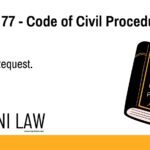Introduction
Special Judges play a key role in handling corruption and related offences under the Prevention of Corruption law. Their powers, procedures, and jurisdiction are clearly defined to ensure speedy and fair trial. The Prevention of Corruption law overrides general provisions of the Criminal Procedure Code to streamline trials and give Special Judges wider authority.
What Does A Special Judge Do In Corruption Cases?
Special Judges must exclusively try offences listed under Section 3(1), regardless of the Code of Criminal Procedure, 1973, or any other law. These cases must be heard by the Special Judge in the area where the offence occurred or by a judge specifically appointed for that case. If multiple Special Judges exist in the same area, the Central Government will designate one to handle the case.
A Special Judge can also try other related offences in the same trial if permitted under the CrPC. Trials must proceed on a day-to-day basis as far as possible. The goal is to conclude the case within two years. If not completed within this time, the Special Judge must record the reasons. The trial period can be extended by six months at a time, with written reasons. However, the total period should not exceed four years under normal circumstances.
What Are The Duties A Special Judge Does In These Cases?
A Special Judge can take direct cognizance of offences without the case being committed for trial. While trying the accused, the judge must follow the CrPC procedure for warrant cases by Magistrates. The judge can offer a pardon to anyone directly or indirectly involved in the offence. This pardon is valid if the person gives a full and truthful disclosure about the crime and everyone involved. It will be treated as a pardon under Section 307 of the CrPC.
All CrPC provisions apply to Special Judge proceedings unless they conflict with this Act. For this purpose, the Special Judge’s court is considered a Court of Session, and the prosecutor is treated as a Public Prosecutor. Sections 326 and 475 of the CrPC also apply, and the Special Judge is considered a Magistrate under these sections.
The Special Judge can impose any legal sentence on a person found guilty. While trying offences under this Act, the judge can also use all powers and functions of a District Judge under the Criminal Law Amendment Ordinance, 1944.
Can A Special Judge Take Cognizance?
A Special Judge can take direct cognizance of offences without the case being committed for trial. While trying the accused, the judge must follow the CrPC procedure for warrant cases by Magistrates. The judge can offer a pardon to anyone directly or indirectly involved in the offence. This pardon is valid if the person gives a full and truthful disclosure about the crime and everyone involved. It will be treated as a pardon under Section 307 of the CrPC.
All CrPC provisions apply to Special Judge proceedings unless they conflict with this Act. For this purpose, the Special Judge’s court is considered a Court of Session, and the prosecutor is treated as a Public Prosecutor. Sections 326 and 475 of the CrPC also apply, and the Special Judge is considered a Magistrate under these sections.
The Special Judge can impose any legal sentence on a person found guilty. While trying offences under this Act, the judge can also use all powers and functions of a District Judge under the Criminal Law Amendment Ordinance, 1944.
Case Law
In the landmark case of State of Tamil Nadu v. V. Krishnaswami Naidu (1979), the Supreme Court clarified the powers of Special Judges under the Prevention of Corruption Act. The Court held that a Special Judge could take cognizance of offences directly without the case being committed to him, as per Section 5(1) of the Act. It upheld that the procedure followed should align with the CrPC for warrant cases by Magistrates. This ruling reinforced the independence and authority of Special Judges in handling corruption cases, ensuring faster proceedings and reduced procedural delays. The decision remains a key precedent in interpreting the powers and procedural scope of Special Judges in India.
Conclusion
In summary, Special Judges have exclusive jurisdiction to try specific offences, follow CrPC procedures, and exercise enhanced powers, including granting pardons and passing full sentences. These provisions aim to ensure faster, transparent, and effective delivery of justice in cases involving serious offences.








